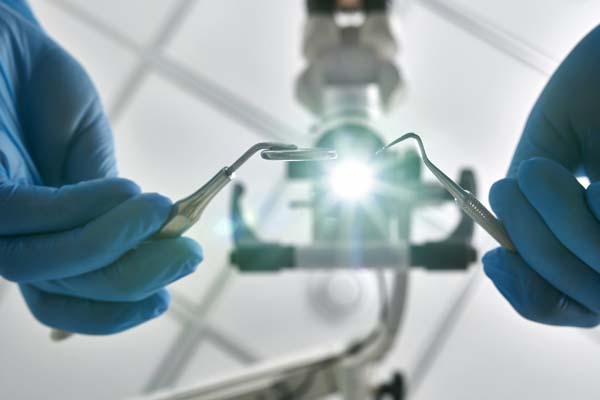Relieving Pain With Root Canal Therapy

Root canal therapy is often recommended to resolve issues that cause severe tooth pain, such as deep dental decay and tooth infection. In addition, root canal therapy can also save a damaged tooth from needing to be extracted, falling out, and/or causing concerns with surrounding teeth and the gums.
Relieving pain with a root canal treatment
A dentist may recommend root canal therapy if alternative treatment options are not viable options to restore the health and appearance of a tooth that is damaged, decayed, or infected. The following discussion highlights how root canal therapy can help relieve dental pain.
Root canal therapy defined
Root canal therapy is a dental procedure that involves removing diseased or decayed pulp inside the pulp chamber, which is located inside of the tooth’s root. This procedure is typically recommended to treat deep dental cavities and oral infections that infect the dental pulp inside of the tooth. It is often used as a last option when less invasive procedures such as a dental filling are not an option to avoid the loss of the tooth or the worsening of symptoms.
When root canal therapy is recommended
Root canal therapy is used for several reasons. The primary purpose of root canal therapy is to treat tooth infections. A tooth infection can result when bacteria accumulate inside the root of the tooth. In many cases, a dental abscess can form as well, which can be drained during a root canal procedure and/or with the use of antibiotics.
Another use for root canal therapy is treating deep tooth decay. While minor cavities can be addressed with a dental filling, a more severe cavity that extends deeper toward the tooth’s root may require root canal therapy. The best way to determine if root canal therapy or an alternative procedure is most appropriate for you is to visit a dental professional.
The root canal therapy procedure explained
The root canal therapy procedure is a minimally invasive procedure, but some dental offices offer sedation to increase the patient's comfort. The procedure typically involves accessing the root of the tooth, which may involve drilling a small hole in the tooth. The decayed, infected, or damaged portion of the tooth’s dental pulp is then removed, then the tooth is filled with a substitute material that is known as gutta-percha. The tooth is then sealed and a temporary crown is placed while the patient awaits their custom permanent crown from the laboratory.
Recovering from root canal therapy
The patient should not feel much, if anything, during the root canal procedure, but there is typically some discomfort for up to a week after the procedure. To help ensure a fast and successful recovery following a root canal, it is important to keep the mouth clean at all times by brushing, using mouthwash, and staying hydrated. Patients can also use a cold compress and a saltwater rinse to alleviate swelling and discomfort, as well.
The risks of leaving an infected or decayed tooth untreated
In many cases, an infected or severely decayed tooth that is left untreated leads to worsening symptoms, including more intense tooth pain and sensitivity, worsening gum swelling and inflammation, and the spread of an oral infection to other parts of the mouth and body. After severe symptoms develop and the root of the tooth continually weakens, the tooth may fall out naturally or become so severely damaged that extraction is necessary. This leads to the need for tooth replacement, which makes the treatment process longer, more costly, and invasive.
The risks of root canal therapy
There are risks of root canal therapy, although complications are incredibly rare. Most notably, a failed seal of the tooth when completing the root canal therapy process can lead to food particles and bacteria invading the tooth and causing additional decay or infection, which both lead to painful symptoms and a need to return to the dental professional for retreatment. With that said, the success rate of root canal therapy is well above 90% (American Association of Endodontists) and complications are relatively easy to address if they do occur.
Are you experiencing tooth discomfort?
It is important to treat tooth discomfort as quickly as possible to avoid any worsening concerns. If you are experiencing issues that suggest you may need root canal therapy or an alternative procedure, then we encourage you to call our dental team today to schedule a convenient time for a visit.
Request an appointment here: https://agourahillscosmeticdentists.com or call The Smile Spa at (818) 573-2196 for an appointment in our Agoura Hills office.
Check out what others are saying about our dental services on Yelp: Root Canal Treatment in Agoura Hills, CA.
Recent Posts
Finding out that you need a root canal can be terrifying. This procedure has always been seen in a negative way. In truth, this treatment can restore your dental health. Here are the details on how a root canal can prevent tooth loss.The dentist will remove the inflamed or infected pulp material from its chamber.…
Root canal treatment can keep an injured or decayed tooth in place. You may start feeling unsure of taking this path because of its reputation of being too painful. On the contrary, your dentist will make sure you will not feel any pain during the procedure. Recovery is another issue to face after going through…
When a tooth root becomes infected by bacteria, a root canal treatment may be recommended to remove the infected tooth tissue. While some may fear this procedure, the truth is there is more to worry about in the consequences of not receiving a necessary root canal than of getting one in the first place. Failing…
If the dentist has recommended a root canal treatment, then there is a chance that you have an infected tooth. If the infection is not treated, it can spread from the tooth to the gums and jawbone around the decaying pulp. A significant infection might result in the loss of a tooth or jawbone. Untreated…


